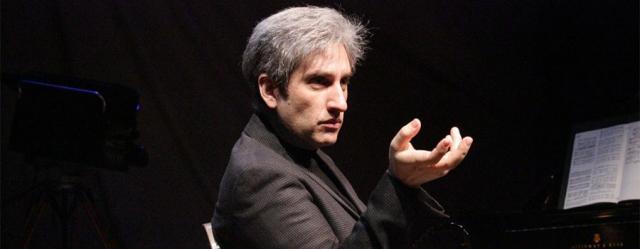
Hershey Felder goes for the gold in Maestro, his one-man play about the great American composer/conductor/educator Leonard Bernstein. It’s quite a challenge to try and capture Bernstein’s many astonishing gifts in a single, brief evening, but Felder manages to do it — with much flair and finesse as well. Felder, whose previous musical solo shows include “George Gershwin Alone,” “Monsieur Chopin,” “Beethoven, as I Knew Him,” and “Hershey Felder as Irving Berlin,” is ideally suited to play Bernstein. He not only resembles him physically and can act the part, but he plays piano himself and has a decent singing voice. Above all, he is a charismatic performer who commands the stage in a strong, confident way. Bernstein, who was born in Lawrence, Mass. in 1918, grew up in a lower-middle-class Jewish household dominated by his strict, Talmud-reading father. Although he was a prodigy, Bernstein had to battle ferociously to make his mark in music, taking on not only parental disapproval but entrenched anti-Semitism. Harvard University, which he attended on scholarship, had a Jewish quota in those days, and when he began his career as a conductor, he was urged to change his name to Berns, because “Jews would never be allowed to lead a major orchestra in this country.” Bernstein, as Felder shows so convincingly, refused to knuckle under. He not only kept his name but proclaimed his Jewishness in such later symphonic works as “Jeremiah” and “Kaddish.” His career was also greatly aided by such admirers in high places as the conductors Serge Koussevitzky, Dimitri Mitropoulos, and Bruno Walter. Felder brings to life the high points of Bernstein’s years: heading the New York Philharmonic, playing piano and writing sonatas, symphonic works, and operas. And that’s just for starters: Bernstein also wrote ballet and movie scores (“On the Waterfront”) and, of course, such Broadway musicals as Wonderful Town and West Side Story. He also made his mark as an educator, teaching at Brandeis, Tanglewood and other institutions. And from 1958 to 1972, Bernstein had a national TV show, “Young People’s Concert,” which he wrote and appeared in as commentator, piano-soloist, and conductor. The show helped convert an entire generation of casual American listeners into avid music lovers. Felder does not neglect the personal side of Bernstein’s life. His restless, yearning spirit comes through, also his deep yet conflicted love for his wife, Felicia Montealegre. He married her in 1951 and had three children with her, yet left her in the 60s to live with another man. Maestro does not shy away from dealing with Bernstein’s bi-sexuality, nor does it hold back from confronting his left-of-center politics, especially his forthright defense of the Black Panthers’ cause. As a man Bernstein “contained multitudes.” It is to Felder’s credit that he gives us a strong, bracing taste of those multitudes. His tour de force performance is aided by Joel Zwick’s expertly paced direction and by Christopher Ash’s copious video projections.
